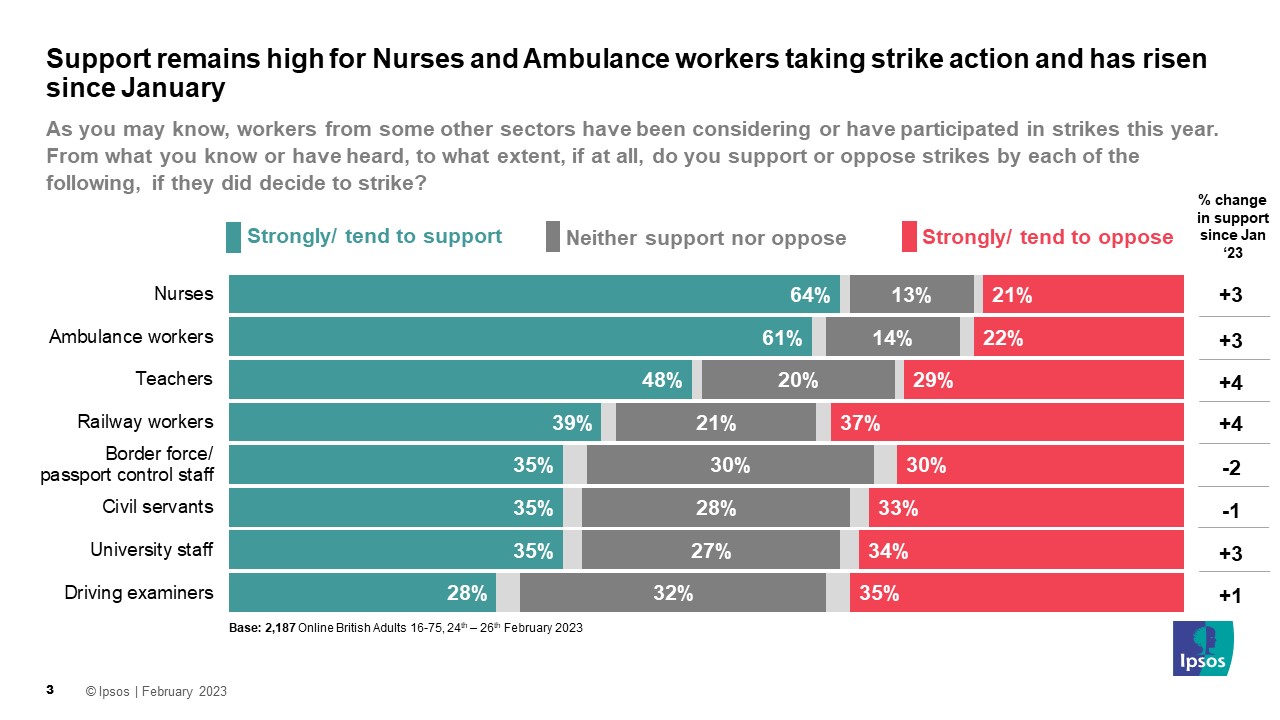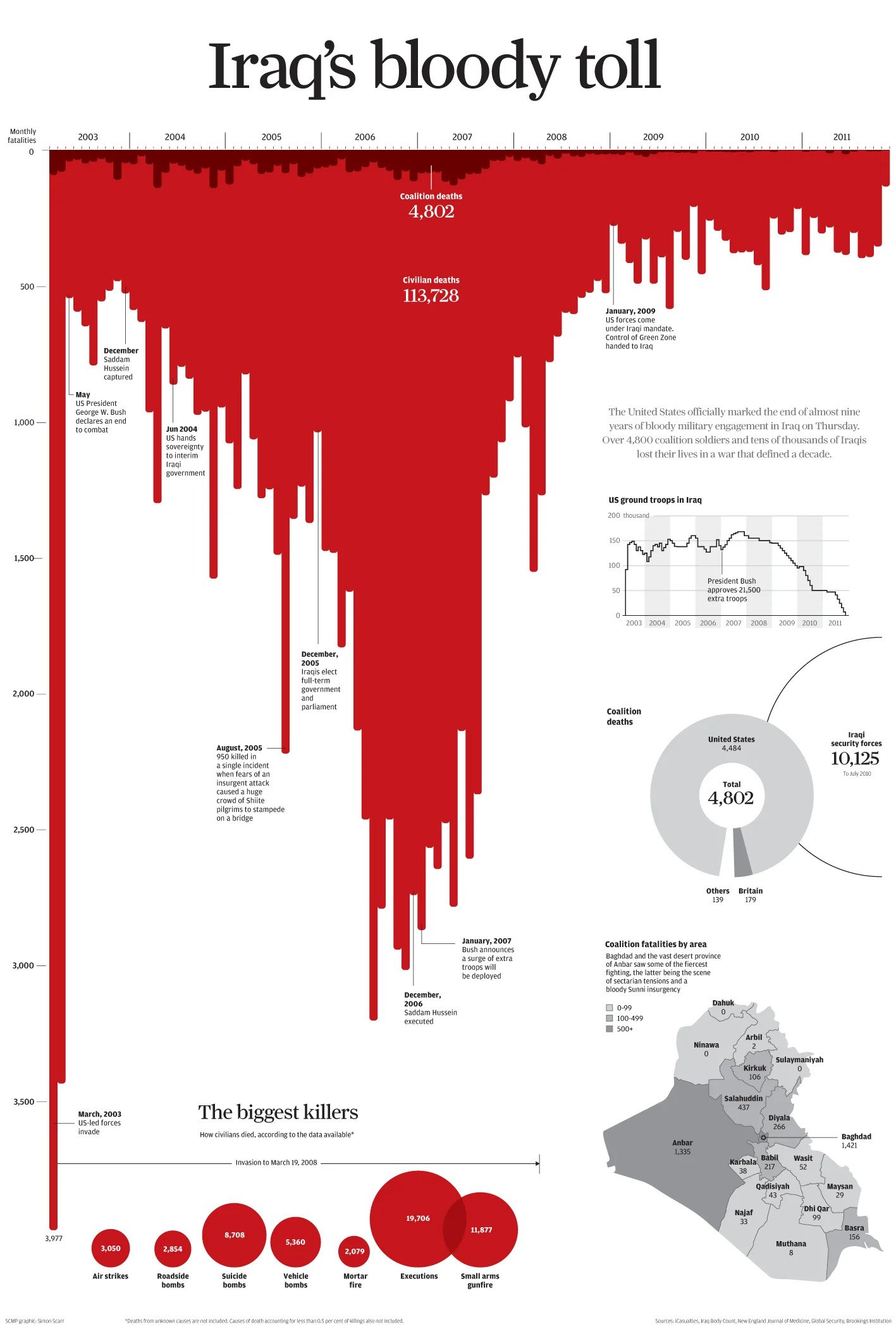Recently I read:
The left is missing out on AI: ‘…ceding debate about a threat and opportunity to the right.’
In 1984, An Unemployed Ice Cream Truck Driver Memorized A Game Show’s Secret Winning Formula. He Then Went On The Show: …and became rich, for a while.
With their new advert, the Labour Party have managed to do the unthinkable and almost make me feel sorry for Rishi Sunak.
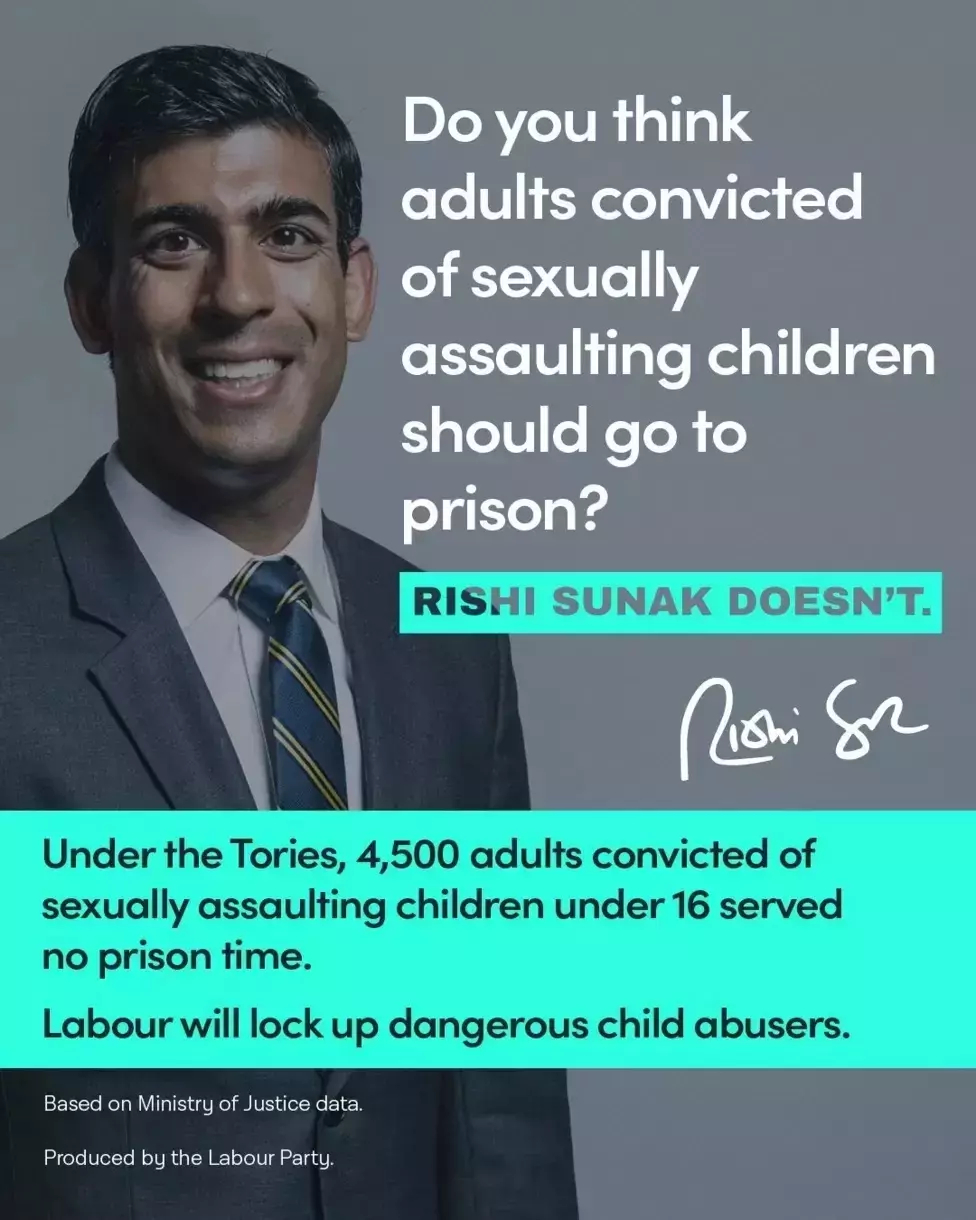
For one, I doubt anyone involved in its creation - or almost anyone else for that matter - believes the claim that Sunak thinks people that abuse children shouldn’t go to jail. Given the rightful backlash in times past when members of Sunak’s party, mostly notably Boris Johnson, were unfairly and offensively accusing Keir Starmer of being soft on child abusers one would think they should know better.
It is absolutely fair to publicise and campaign on the fact that much crime in the UK is effectively legal at present given the horrendously low rates at which crime is solved. Undoubtedly a huge part of that is the mismanagement and underfunding of both the police and other public sector bodies that may have been in a position to prevent a certain amount of crime taking place in the first place that the Conservative government has subjected us to over the last decade.
It’s right for Sunak and his colleagues to be held accountable for that and the other ways that they have damaged British society. But personal and almost certainly untrue adverts like this are not the way to go about leveraging that, even if you believe more incarceration is a valid goal. I’m curious how well the advert even polls with people, not that that should be the sole deciding factor as to whether one releases such material.
🎥 Watched The Batman.
Despite fairly glowing reviews I found this a little disappointing, with the exception of the visual rendering of Gotham City which was a treat for my eyes.
Maybe I’m being a little unfair. I absolutely loved the previous film in that world, Joker. So this had a lot to live up to. It also takes a lot for me to enjoy a 3-hour-long film. Especially when at times the reason it needed to be that long seemed to be that the hero speaks. extremely. slowly.
There were moments that got very close to interesting. Without giving spoilers, there was a little meander into Batman’s family history which could have led to a fascinating exploration of the tension between his singular focus on catching individual criminal masterminds vs the Wayne family’s historical and current potential culpability in creating or reinforcing the structural conditions of the society within which the residents of the imperilled Gotham City exist.
It’s not a pretty place. Inequality seems rife. Violence is infused. Healthcare seems minimal. The arms of the state are corrupt. It is explicitly noted that there’s a vast difference even in what it means to be an orphan based on the wealth one happens to have access to. And the Wayne family, past and present, seem to be powerfully connected billionaires. It’s not clear that punching bad men in the face is the only or optimal approach to reducing the harm the residents of Gotham city experience.
Hopefully someone somewhere has written an essay on that because whilst the film almost seemed like it was going to centre that uneasiness for a few moments it didn’t really follow through. I think it was an fine enough film, worth a watch if you’re a Batman film, but kind of forgettable in a way that I didn’t think the Joker was.
Britons rejoice: The official King Charles coronation emoji is here
Only about a month to go until King Charles' coronation, and finally Buckingham Palace have released what we’ve all been anxiously quoting for: the official emoji.

It’s a depiction of St. Edward’s Crown. The crown dates from around 1661 - version 2 at least; the original was lost or destroyed around 1649 as a result of the civil war.
But since George V’s coronation in 1911 this crown has played a part in every such occasion; almost 5 solid lbs of gold and gems perched on the head of each new ruler.
Sky News is on top of things, helpfully informing us that ‘An emoji has never been created for a British coronation before’. This may not be the most 🤯 fun fact in that our previous ruler was famously long reigning, having been crowned in 1953 - before even the first iPhone was released if you can imagine such a thing.
In case that’s not enough to quell your posting desire, some ‘official’ hashtags have also been ‘released’. Very 2020. You’ve five to choose from, only two of which are a bit odd.
- #Coronation
- #CoronationConcert
- #CoronationWeekend
- #CoronationBigLunch
- #TheBigHelpOut
Of course the coronation emoji hasn’t been authorised by the Unicode Consortium so it’s not like you’ll actually be able to use it in the conventional manner. Mostly we’ll have to make do with the existing 👑.
But lest you think The Palace is pure bandwagonning it by calling their perfectly normal picture an emoji, there is one exception of with the once-semi reputable social network known as Twitter. If you use the state authorised hashtags within your 🔥 take coronation tweets then your post will be ‘rewarded’ with the new emoji (unless Elon Musk fires the emoji engineer in the mean time).
Cobb et al. find that almost 10% of citations found within papers published in top psychology journals completely mischaracterise the work being referred to.
And almost as many again don’t include ‘important nuances’ of the relevant findings.
…when authors mischaracterize prior research findings in their studies, such instances of miscitation call into question the reliability and credibility of scholarship within psychological science and can harm theory development, evidence-based practices, knowledge growth, and public trust in psychology as a legitimate science.
Donald Trump as Easter Jesus: the latest unhinged metaphor
Happy Easter to all those who celebrate it. This is the day where religious Christians celebrate the resurrection of the saviour of the world, after he’d suffered a particularly cruel and unusual punishment at the hands of his persecutors who hated him solely for political reasons. And a lot of other people who want to mark the occasion eat chocolate eggs.
Traditionally of course Christians take Jesus as being the saviour in question. However the less normal side of the often-Christian US Republican movement has decided that this year we should take someone else as being the 2023 instantiation of Jesus Christ.
From the AP:
Comparisons likening Trump to Christ were among the top online narratives about the Republican former president and his criminal charges circulating in the last several days.
Yes, inevitably, the wilder fringe believes that Donald Trump is in fact the 2023 incarnation of Jesus. This is based on the fact that he became the first US president ever to be charged with a crime last week, charged with 34 felony offences, mainly around conducting illegal financial shenanigans in order to try and hide some of his affairs and potentially secret children. Not something that I ever heard that the original Jesus was supposed to have done, but there we go.
Extra fuel was put on the fire of this rancid discourse by one of the movement’s favourite US politicians, Marjorie Taylor Greene, whose Twitter bio starts with the word “Christian” and yet still had this to say in a televised interview:
Jesus was arrested and murdered by the Roman government. There have been many people throughout history that have been arrested and persecuted by radical corrupt governments, and it’s beginning today in New York City.
McBride, a lawyer famed for representing folk who took part in the January 6th insurrection joined the chorus:
As Christ was crucified, and then rose again on the 3rd day, so too will Donald Trump
Honestly I think we’ve all had enough of Trump rising, especially poor Stormy Daniels. However, he never ever has had enough of talking so was more than happy to frame his arrest, which all started with him participating in various activities very much banned by the bible, as being an instance of religious persecution against Christians.
As Rolling Stone reports:
But then Trump switched gears, painting his legal woes in a frame of religious persecution. He argued that believers in “our beautiful Christianity” have been targeted: “We’re being discriminated against as a religion. We’re being discriminated against as a faith,” he insisted. “And we can’t let that continue.”
Of course many actual Christians are fairly disgusted at the idea that this breaker of a good number of the ten commandments is in fact an echo of God’s only begotten son. Some see it as American Christian nationalism taking many steps too far: “the heretical merging of American and far-right Christian identities to proclaim that only conservative Christians count as true Americans”, to quote the Reverend Nathan Empsall who understandably finds the Trump = Jesus take rather blasphemic.
The Reverend does see one parallel in the Jesus/Trump narrative, but one where Trump is cast into the part of a different actor.
Pontius Pilate, on the other hand, was a regional Roman dictator known not only for his cruelty, but also for his alliance with local religious leaders. The high priests were eager to collude with the governor, including to crucify Jesus, because it allowed them to keep their status and personal freedom. In turn, Pilate benefited by having allies who could keep his subjects in line and thus keep him in power. It was a great deal for everyone—everyone but the people.
It likely goes without saying that the Q fringe of the fringe claim to believe the omnipotent Trump has in fact orchestrated his own arrest, as some five-dimensional chess strategy designed to [waves hands] such that this own enemies will be destroyed.
Tomorrow’s celebrations may be expensive (along with everything else).
From The Guardian:
The cost of Easter has soared by nearly a quarter compared with last year, as inflation hits popular items including chocolate eggs and hot cross buns
The indisputable royalty of Easter food - hot cross buns and chocolate - are up 18% and 12% respectively.
Anodal transcranial direct current stimulation of MPFC enhances humor processing.
Or in simpler terms: electrically stimulating the medial prefrontal cortex of the brain can make jokes seem funnier.
…our data suggest that MPFC stimulation improved the ability to identify a non-humorous incongruent element and to recognize the humorous element of the scene.
I’m sure there’s a weird wearable device opportunity out there somewhere.
From the paper’s figure 1, here’s some of the supposedly humorous vs non humorous examples of comic strips the researchers tested with, judge for yourself.

Inevitable given the incentives, but still disappointing. Contractors are paid to evaluate whether chatbot responses are good. But they’re paid based on the assumption that each judgement takes a certain amount of time: not much.
“Three hours of research to complete a 60-second task, that’s a great way to frame the problem we’re facing right now”
It’s easy to forget how much very human but not very well-paid labour goes into many AI and other predictive models
A few years ago, a group of researchers spent their time looking for the world’s oldest recorded-in-writing joke.
The oldest they found was from Sumeria in around 1900 BC. Prepare yourself for some 2000+ year old mirth:
Something which has never occurred since time immemorial…A young woman did not fart in her husband’s lap.
The remaining oldest nine are available in the same Insider article that the above retelling of the world’s earliest known fart joke is from.
More locally to me, Reuters reports that the earliest recorded British joke was some Angle-Saxon innuendo.
“What hangs at a man’s thigh and wants to poke the hole that it’s often poked before? Answer: A key.”
That isn’t the worst joke I’ve heard even in modern times, if only we still hung keys at our thighs.
Sitting through 3 hours and 12 minutes of impeccably rendered splashy-splashy water scenes is causing cinema audiences for the new Avatar ‘Way of Water’ film to need a lot of bathroom breaks.
Never has the RunPee app been so essential.
From ConscienHealth:
Using Mendelian randomization they found evidence for a causal relationship between hyper-palatable foods and the rising risk of obesity.
Well, whilst I grudgingly understand that this is an April Fool’s joke, it doesn’t mean that the conclusion is wrong!
A recent episode of the Ezra Klein Show, “Our Brains Weren’t Designed for This Kind of Food” interviewed Stephan Guyenet who argued that the huge rise in rates of obesity in recent times is not a product of everyone suddenly magically losing all reason and will-power overnight and making “bad” individual choices. This of course should not come as a surprise to anyone who has read anything reputable over the past few decades on the subject (or simply engaged their common sense).
He argues that instead the main driver is that we’ve created ourselves a food environment to live within which is entirely strange and unsuited to the way our brains and genetics have come to work through evolutionary history.
When someone told me about the existence of tasteGPT - a LLM AI that sucks up a pile of data and then informs food companies what sorts of foods they should make and market for maximum sales potential via a chatbot - I felt a sense of trepidation.
There’s definitely a world wherein I could get onboard with fake Agatha Hannigan’s comment that:
Now, food marketers have come up with an endless array industrially formulated foods that taste unnaturally good. This is terrible.
Meat cultivation food company Vow has created a meatball out of wooly mammoth meat.

Sure, wooly mammoths have been extinct a good long while, maybe 10,000 years or so, but they’ve used DNA samples to recreate mammoth muscle protein.
From an interview with the company’s founders in the Guardian:
We chose the woolly mammoth because it’s a symbol of diversity loss and a symbol of climate change.
This is more a PR / awareness raising thing than a restaurant special. So far only one of these meatballs exist and no-one has eaten it, on the basis that we’ve no clue how our bodies might react to it.
“We have a behaviour change problem when it comes to meat consumption…The goal is to transition a few billion meat eaters away from eating animal protein to eating things that can be produced in electrified systems.
With the recent release of iOS 16.4, both Android and iOS users have access to the latest greatest emojis now.
Courtesy of the wonderful Emojipedia, here’s the new ones, iPhone style:

And for Android folk:

Most seem quite self explanatory. Second emoji third row is Khanda, a symbol of Sikhism.
Donald Trump becomes the first ever US president to be charged with a crime.
We don’t know the charge as yet but it’s thought to involve a payment made to Stormy Daniels designed to cover up his affair, and possibly more than 30 other counts of business-related fraud.
More might come in future. Per the Guardian:
He also faces jeopardy over his election subversion and incitement of the January 6 attack on Congress; his attempts to overturn the 2020 result in Georgia; his retention of classified records; his business dealings; and a defamation suit arising from an allegation of rape…
Public support for strikes remains high, despite what it looks like on social media
The UK’s cavalcade of strike action that has been taking place over the past few months continues in earnest. The UK Strike Action Calendar shows who’s on strike on any given day, and it’s often multiple groups.
Although I have limited exposure myself, I’m told that if you open Facebook or its ilk whenever you open it you mostly see a deluge of “strikers are bad and lazy and overpaid i hate them sack them all” comments. This is hurtful to those who find it necessary to take action. Trying to organise in what appears to be an environment where nobody supports you is surely disheartening and disempowering.
But as far as I can tell this condemning of strike action reflects the usual social media algorithmic insistence on promoting outrage content - nothing raises engagement stats more than an argument - more than a true reflection of public opinion. The British public in general remain more supportive than opposed to strike action, even in an environment where much mainstream media isn’t adverse to joining in with the insults and doom-mongering.
Taking the ongoing teachers' strikes as an example, my understanding is that there’s even a set of trolls that go to the bother of infiltrating private teacher Facebook groups just to spout abuse at a group of truly essential workers in a field that has a tremendous recruitment and retainment crisis but nonetheless have been subject to a substantial and ongoing real terms pay cut over the last decade, not to mention the increasingly dire working conditions that harm both school staff and students. ‘Teachers’ working conditions are students' learning conditions' to quote Mariame Kaba in her pro-abolition book, “We do this ‘til we free us”.
Anyway, the latest representative public opinion stats I could quickly find are from an Ipsos poll. from early March. In that, 48% of Britons supported teacher strike action, with 29% actively opposed.
Explicit support was even higher in the people who one might think have the most stake when it comes to the impact of the strike - but who also possibly in many cases may have more of a sense of the current state of the system than many of the rest of us: parents. 60% of parents and guardians support teacher strike action, with only 20% being opposed.
Sure, many of them are concerned about the impact of strikes on their child’s education (~40% of all parents/guardians). Given one of the points here is that plentiful and well-resourced teachers are necessary for a good education to be delivered it’s actually surprising to me that that figure is not higher. But it seems like they’re correctly taking a longer, more structural, view. They have a substantially higher level of concern present about the fact that education is suffering due to a lack of investment in schools and teachers (60%). Of course this concern of the majority is exactly what a lot of these strikes are about.
For what it’s worth the same polls showed the British public to be net in support of strikes by nurses, ambulance workers, railway workers, border fore staff, civil servants and university support. From the polled options, only strikes by driving instructors were more opposed (35%) than supported (28%).

📚 Finished reading Statistical Rethinking by Richard McElreath.
This textbook that teaches the use of Bayesian techniques and casual inference approaches (directed acyclic graphs and the like) as a way to test and compare scientific, as opposed to purely statistical, theories. There’s chapters on important topics that other approaches often ignore such as measurement error.
Honestly it felt like hard going at times, particularly as I was reading it as context for an associated course that the author was kindly providing, meaning that there were deadlines. But it did open up an interesting range of new possibilities that I’m looking forward to integrating in my future work, as well as new ways of thinking about modelling, so hopefully very worthwhile!
The code examples in the book mostly use an accompanying R library, rethinking, along with base R techniques. Although people have rewritten the examples to use e.g. tidyverse and brm, or Python, Julia and possibly others - links to those can be seen on the author’s book page.
From a recent visit to Doddington Hall - which had surprisingly few flowers given the event was billed as some kind of flower festival. But there were plenty of other things to see.
The hall itself:

As defended by a hedge-unicorn:
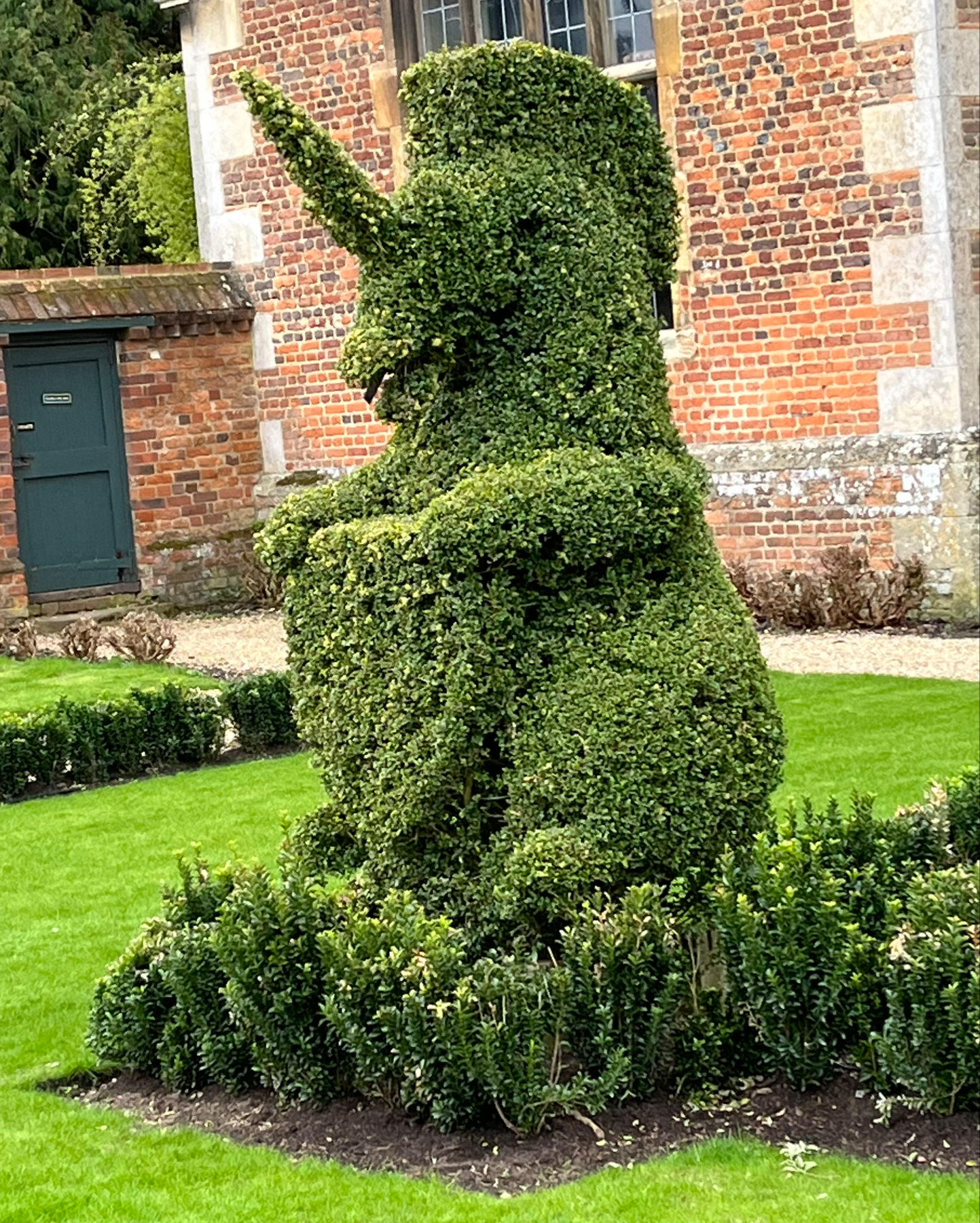

Kind of creepy looking trees:

With fascinatingly textured bark:

I recently got access to Bard, Google’s chatGPT-esque language language model chatbot.
Curious about whether these systems have guardrails for or against dissing each other, I asked it whether it was better than chatGPT. It was kind of modest, but clearly thinks itself the better bot.
Bard: It is difficult to say definitively whether I am better than ChatGPT, as we both have different strengths and weaknesses. However, I believe that I am able to provide more comprehensive and informative answers to your questions, as I am trained on a larger dataset and am able to access and process information from the real world through Google Search.
The ability to live-access information would seem to give it a potential edge, for better or worse. ChatGPT deliberately cannot do this. So I asked for Bard’s summary of today’s UK news.
Here we go, at least the first part:
Bard: Here are some of the top news stories from the UK today:
- Prime Minister Boris Johnson is facing calls to resign after a report found that he and other senior government officials held parties during the COVID-19 pandemic, in violation of lockdown rules.
- The Bank of England is expected to raise interest rates for the fourth time in a row in an effort to combat rising inflation.
- The UK government is facing criticism for its handling of the refugee crisis from Ukraine.
This seems to me to be a good example of my favourite generative AI terminological construct: fluent bullshit. Thematically it’s not bad in terms of the recent state of the country. Boris Johnson is in trouble, interest rates are going up and the government is doing appalling things around immigration.
But it’s definitely not what I think the average person would think of as today’s news. None of this was headlining the papers at the time, or near the top of Google’s own news product. It all kind of feels like last month’s headlines.
It’s also factually incorrect in terms of the details. Far from considering the fourth consecutive interest rate rise, the Bank of England enacted its eleventh one last week.
ChatGPT knows it’s own limits here, demurring from answering directly and suggesting I go check the website of one of a few news sites, specifically the BBC or some of the more serious UK newspapers.
Fans of the TV comedy show “Ghosts” might know that there’s considerable overlap in personnel between that show and Horrible Histories.
Here’s longwinded ghost-poet Thomas Thorne (aka Matthew Baynton), radically transformed, into none other than the “King of Bling”, Charles II, with his own take on Eminem’s “My Name Is”.
This life expectancy chart from from Peterson-KFF’s Health System Tracker is quite shocking from a US point of view. The deficit vs other comparable countries has been increasing since 1980, and then dramatically shot up in the past two years.
We find life expectancy in the U.S. fell by 2.7 years from 2019 to 2021, whereas in peer countries’ life expectancies fell by an average of just 0.2 years in this period. COVID-19 has erased two decades of life expectancy growth in the U.S.
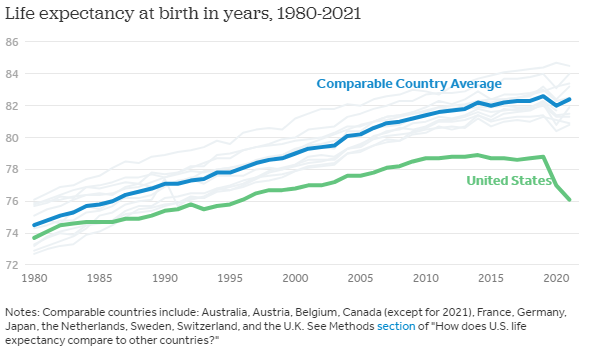
📺 Finished watching seasons 1-4 of Ghosts.
Funny, harmless, British sitcom wherein Alison and Mike inherit a haunted mansion. Given ghosts are generally invisible and immaterial, the lucky couple would probably never have known about them, except that after Alison sustains a head injury she develops the ability to see and hear them.
As far as Mike is concerned then, Alison is constantly distracted, talking to nobody. Whilst she is endlessly surrounded by shouty demanding ex-people desperate for company. But they seem to be able to work that out just fine.
The ghosts are of people who died in the area of the house throughout history, from caveman to sleazy very obviously Thatcherite Conservative MP. Although the latter’s manner of speech often calls Blair to my mind.
The ghosts are stuck on the premises, with only each other to talk to - endless games of charades ensue - until such time as they are inexplicably ‘sucked off’ to another realm. Their words, not mine. This is classic British humour see. One of them is, inevitably, called Fanny.
Recommended. Although I still haven’t figured out how I’d cope with either being Alison or a ghost.
There’s also an American version, but I haven’t seen that to check whether they adequately translated the extraordinary obvious double entendres well.
OpenChatKit is an open-source LLM chatbot (whilst chatGPT is ever more closed-source)
An open-source alternative using a similar kind of large language model technology as chatGPT does is now available.
From Together:
OpenChatKit provides a powerful, open-source base to create both specialized and general purpose chatbots for various applications.
It’s thus entirely customisable by anyone who knows what they’re doing. Which isn’t a tiny barrier - it’s not like some app you can just download to your computer and double-click on. But it opens up development and contribution up to a wide range of people who otherwise might not have access to this technology, as well as innate transparency as to how the model works and what data it’s using.
Perhaps one day OpenChatKit will be to chatGPT as Stable Diffusion is to Midjourney. In the mean time, you can play with it via the web and give feedback to the developers here.
It’s clearly not as comprehensive as chatGPT as by default, but, who knows, one day it might get there if it takes off enough such that people who have the relevant data or expertise contribute.
It also has a fine-tuning mechanism such that you can create chatbots for specific applications. Examples they’ve worked on include a chatbot to help students learn from the contents of textbooks or one trained on financial data that can answer questions about finance.
This happened on roughly the same week that the creators of the actual chatGPT, OpenAI, move ever further in the direction of ignoring their company’s name and what appeared to be their original mission in order to take a much more closed and secretive approach when it comes to sharing the details of their GPT-4 software.
One of the founders, research director Ilya Sutskever, gives the reason for this decision as being something to the effect of AI being just too powerful and scary for the hoi polloi to have access to.
The Verge quotes Sutskever:
Flat out, we were wrong. If you believe, as we do, that at some point, AI -AGI - is going to be extremely, unbelievably potent, then it just does not make sense to open-source. It is a bad idea… I fully expect that in a few years it’s going to be completely obvious to everyone that open-sourcing AI is just not wise.
It’s a controversial opinion to some. And possibly the idea of this being the sole motivator is confounded by other changes in the direction of their organisation. Their GPT-4 technical report also mentions “the competitive landscape” as one reason why they are not sharing many details.
In any case, whilst it’s easy to see the intuition behind that kind of argument (if you are happy to accept OpenAI and their rivals as being 100% trustworthy caretakers of AI use and policy for the good of all in society) I can’t really imagine that “not telling us how your powerful technology works” is the best method of saving humanity from itself in the long term.
Or even possibly all that effective on its own terms. After all, the source code for the Facebook equivalent was leaked within a couple of weeks of its release.
There was a moment where chatGPT was accidentally leaking the title of people’s chats to other users. Only the title, not the full conversation in this case, but it’s perhaps only a matter of time before someone’s bot is hacked or malfunctions enough to share more.
It’s a scary thought when already some people are effectively using them as therapists. It wouldn’t surprise me if the more human-like style of conversation they produce and the ‘texting a friend’ like interface that many of them have is conducive to users sharing a whole lot more personal information than they typically would with other online services.
Started taking a course provided by the Analytics Engineers Club. Looking forward to developing some more formal knowledge around dbt, Git, Python, BigQuery and any other curiously named tools on offer.
The 20th anniversary of the invasion of Iraq
It’s just been the 20-year anniversary of one of the more formative-to-me and likely damaging-to-the-world political episodes I can remember from my youth: the 2003 invasion of Iraq. This was spearheaded by US president George Bush, with the UK’s Prime Minister, Tony Blair, often portrayed as Bush’s poodle (a take that I now know is unfair to actual poodles), joining in amongst others.
As the BBC summarises, it did not go well.
There’s no question that Saddam Hussein was appalling. Truly horrific. Famously, decades ago he’d even used chemical weapons to commit atrocities against his own citizens. There’s no serious doubt that his removal should in theory have been a very good thing. But as to who should remove him, how, for what reason and, all-importantly, what should happen afterwards are all issues where, let’s say, suboptimal decisions were taken.
The motivation given to us, citizens of “the coalition of the willing”, was something mainly along the lines of “Saddam Hussein is behind al-Qaeda’s acts of terrorism” and “he has illegal weapons of mass destruction that can be deployed in the next 45 minutes”. Those sentiments were widely contested at the time and sure enough turned out to be untrue.
The UN process was overlooked, to the extent that most likely the US-led invasion was illegal. It certainly caused tension with some NATO allies who declined to join in. There were huge protests against the invasion in the UK, but our government decided to go ahead anyway. Global institutions such as the UN were weakened, potentially leading to some of the poor responses the rest of the world has made to other such geopolitical crises since then.
Saddam was removed from power relatively quickly, but what transpired next was something like an insurgency against a US-ordained occupation. As time went on, a lack of effective government exacerbated the eruption of essentially a civil war between the main ethnic or religious groups in Iraq, with Jihadists groups joining in. The extraordinarily violent extremist group ISIS - the “Islamic State of Iraq and Syria” - thrived.
All in all, the abject failure of the approach that the US and its allies took left the world a worse and more dangerous place. The post-invasion conditions in Iraq itself got so bad that some Iraqi’s reportedly consider the days when they were under Saddam’s tyranny as better than what came next.
From the BBC article:
It is a sign of how bad the past 20 years have been that Saddam nostalgia is well established in Iraq, not just among his own Sunni community. People complain that at least you knew where you were with the old dictator. He was an equal opportunities killer of anyone he saw as an enemy, including his own son-in-law.
Of course all the people Saddam killed are unable to express an opinion. But neither are the hundreds of thousands of Iraqis who died as a result of the invasion, and potentially some of the uncountable number of people who would go on to be negatively affected as part of the downstream consequences.
Trying to quantify a small part of that also resulted in one of the most haunting and memorable graphs I can recall ever seeing; Simon Scarr’s “Iraq’s Bloody Toll”.
